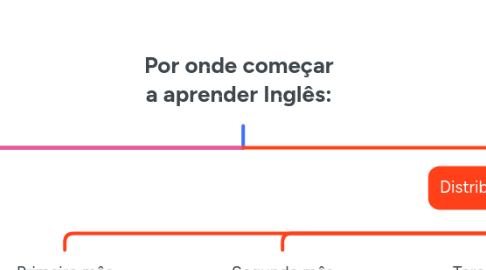
1. COMBINAÇÕES DE VOCABULÁRIO (collocations)
1.1. HAVE
1.1.1. Have a job Have a car Have a family Have a meeting Have a day off
1.2. DO
1.2.1. Do yoga Do the dishes Do a report Do a course Do a test
1.3. MAKE
1.3.1. Make friends Make coffee Make a mistake Make the bed Make plans
1.4. GO
1.4.1. Go to the beach Go to the gym Go to SP Go to work Go home
1.5. GET
1.5.1. Get sick Get tired Get hungry Get home Get a new job
1.6. TAKE
1.6.1. Take a shower Take a picture Take a vacation Take medication Take notes
1.7. STUDY
1.7.1. Study English Study philosophy Study human behavior
1.8. WATCH
1.8.1. Watch TV Watch series Watch the game Watch the sunset
1.9. TRAVEL
1.9.1. Travel to SP Travel for work Travel for pleasure Travel abroad
1.10. PLAY
1.10.1. Play games Play cards Play the piano Play football Play chess
2. ESTRUTURAS DE TEMPO
2.1. SIMPLE PRESENT
2.1.1. I have a meeting I don't have a meeting Do you have a meeting?
2.2. SIMPLE PAST
2.2.1. I had a meeting I didn't have a meeting Did you have a meeting?
2.3. SIMPLE FUTURE
2.3.1. I will have a meeting I won't have a meeting Will you have a meeting?
2.4. WOULD "RIA"
2.4.1. I would have a meeting I wouldn't have a meeting Would you have a meeting?
3. TO BE
3.1. I'm having a meeting I'm not having a meeting Are you having a meeting?
3.2. I'm a teacher I'm 30 years old I'm from Brazil I'm a mother I'm a busy woman
4. Distribuição do conteúdo
4.1. Primeiro mês
4.1.1. Construir os vocabulários com HAVE, DO, MAKE e GO. Treinar todos no presente simples, afirmativa, negativa e interrogativa.
4.1.1.1. Conteúdos adicionais: - Artigos A / AN / THE - Frases com he, she e it no presente simples - Complementos de tempo do presente
4.2. Segundo mês
4.2.1. Adicionar aos seus vocabulários os verbos GET, TAKE, STUDY e WATCH. Treinar todos no presente simples e também no passado simples. Afirmativas, negativas e interrogativas.
4.2.1.1. Conteúdos adicionais: - Possessivos - Pronúncia dos verbos com ED - Complementos de tempo do passado
4.3. Terceiro mês
4.3.1. Adicionar aos seus vocabulários os verbos , TRAVEL, PLAY e WORK. treinar todos eles no presente, passado e futuro simples. Afirmativas, negativas e interrogativas.
4.3.1.1. Conteúdos adicionais: - Pronome objeto - Complementos de tempo do futuro
4.4. Quarto mês
4.4.1. Treinar todos os vocabulários com WOULD. Afirmativas, negativas e interrogativas.
4.4.1.1. Conteúdos adicionais: - WOULD LIKE (Ex: para pedir comida)
4.5. Quinto mês
4.5.1. To be + vocabulários. Afirmativas, negativas e interrogativas.
4.5.1.1. Conteúdos adicionais: - Como falar sua profissão - Como falar sua idade - Como falar de onde você é
4.6. Sexto mês
4.6.1. WH QUESTIONS
4.6.1.1. WHAT WHERE WHEN WHO HOW WHICH
4.7. Sétimo mês
4.7.1. CAN, COULD, SHOULD AFIRMATIVAS NEGATIVAS INTERROGATIVAS

